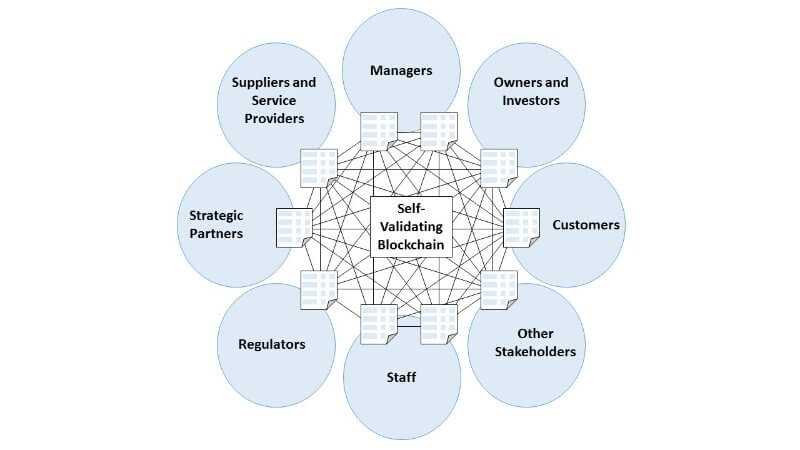Those interested in crypto trading may have come across this term and wondered — what is a DAO in crypto? What does it mean? DAO is seen as one of the most complex forms of contract, at times labeled a decentralized autonomous corporation (DAC), it’s an association that runs through rules encoded on computer programs called smart contracts. A DAO’s financial records and program rules are kept up on a Blockchain. There are a few examples of this plan of action. The exact lawful status of this kind of business association is vague.

The best-known example was The D.A.O, a D.A.O for investment financing, which was started with $150 million in crowd funding in June 2016 and was instantly hacked and depleted of US$50 million in crypto currency. The hack was reversed in the following weeks, and the money was reinstated, by means of a hard fork of the Ethereum Blockchain. This decentralized bailout was made conceivable by majority vote of the Blockchain’s hash rate.

Decentralized Organizations (DO)
The possibility of a decentralized organization takes the idea of traditional organizations, and decentralizes it. Rather than a hierarchical structure controlled by an arrangement of people associating face to face and controlling property by means of the lawful framework, a decentralized organization includes a set of people cooperating with each other as per protocol specified in code, and authorized on the Blockchain.

A Decentralized Organization (DO) might possibly make use of the lawful framework for some protection of its physical property, however even such usage is secondary. For instance, one can take the investor-owned cooperation above, and transplant it completely on the Blockchain; a long-running Blockchain-based contract keeps up a record of every individual’s holding of their shares, and on-Blockchain voting would enable the investors to choose the positions of the board of directors and the workers.
Smart contract frameworks can likewise be integrated into the Blockchain directly, conceivably enabling DOs to control safety deposit boxes, vehicles, and buildings. Decentralized Autonomous Organizations are the holy vessel of DOs: it is a substance that lives on the web and exists autonomously, yet depends heavily on hiring people to carry out specific tasks that the automation itself can’t do.
Disrupting Governance with DAOs
Governance is the way standards, action and activities of how individuals interface with each other are organized, maintained, directed and considered responsible. It manages the procedure of decision making among the actors engaged with an aggregate issue that prompt the creation, support, or propagation of social standards and organizations. The level of convention relies upon the inside guidelines of a given association and, remotely, with its business accomplices. All things considered, administration may take many structures, driven by various inspirations and with a wide range of results.

Governance alludes to all procedures of governing, regardless by a government, network or market, family, tribe – formal or informal, through the laws, standards, power or dialect. Blockchain can alter traditional governance structures of assorted types, and challenge the way we think about governance currently.
With substantial parts of society traditionally composed in top-down command and control ways, Blockchain guarantees for more decentralized and unconstrained coordination rather than rigid structures by addressing to two issues of traditional governance structures:
- Principal-Agent Dilemma
- High transaction cost of coordination
Furthermore, Blockchain and smart contracts lessen transaction cost and levels of bureaucracy and introduce the likelihood of finding better approaches for adjusting interests and governing groups of individuals in a more decentral route than we know today.
Functions of DAOs
Decentralized Autonomous Organizations (DAOs) runs through guidelines encoded as PC programs called smart contracts. It is an element that lives on the web and exists autonomously, yet in addition intensely depends on hiring people to carry out specific tasks that the automaton itself can’t do.

Tokens of Transaction
Before it could exist, a Decentralized Autonomous Organization needs some sort of internal property that is significant somehow, and it can utilize that property as an instrument for rewarding certain activities. Funding’s happen directly upon creation of the organization. DAOs don’t have a progressive structure, nor management or executive.
Autonomous
Once conveyed the substance is autonomous of its makers and cannot be impacted by outside forces. DAOs are open source, in this manner straightforward and incorruptible. A DAO’s financial record and program rules are kept up on a Blockchain. This approach disposes of the need to include a reciprocally acknowledged third party in a financial transaction.
Consensus
In order to move or withdraw funds from a DAO, a greater part of its partners (this rate could be determined in the code of the DAO) must concur on the choice. Regardless of the possibility that bugs are found in the code, they couldn’t be revised until the point when a voting methodology has occurred and the greater part of voters conceded to it, which could leave known security openings open to abuse.
Contractors
A DAO cannot assemble an item, compose code or create hardware. It needs a contractual worker to finish its objectives. Temporary workers get delegated by means of voting.
Proposals
This is the essential route for decision making in a DAO. Preventing people from overloading the network with proposals, a DAO might require a monetary deposit to keep individuals from spamming the network.
Voting
After presenting a proposal, voting happens. DAOs enable individuals to trade monetary value with anybody on the planet, such as investing, fund raising, borrowing, lending without the need of a mediator, just by confiding in the code.
Examples of DAOs
All the cryptocurrencies which utilize open Blockchains are DAOs (Bitcoin, Ethereum, Digix, Dash and so forth.). Present day DAOs are complex smart contracts over a Blockchain. The DAO was an example of a DAO over the Ethereum Blockchain.
Voting Process of the DAO
The exact legal status of this sort of business organization is misty; some comparable methodologies have been regarded by the U.S Securities and Exchange Commission as illicit offers of unregistered securities. However, a DAO may practically be a corporation without legitimate status as a company: a general association.
This implies possibly legal status as a corporation for members, regardless of the possibility that the smart contract code or the DAO’s promoters say something else.

